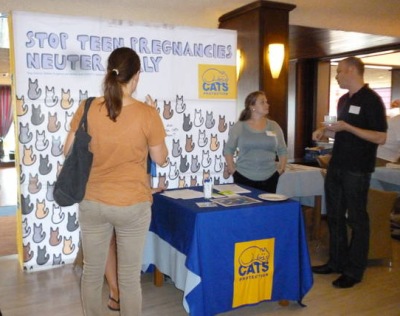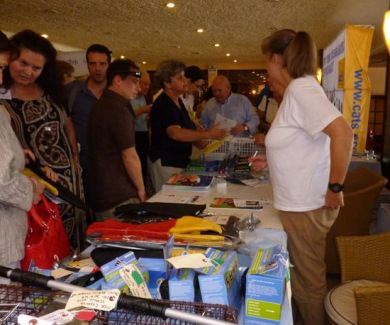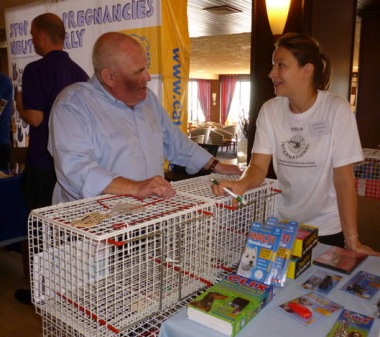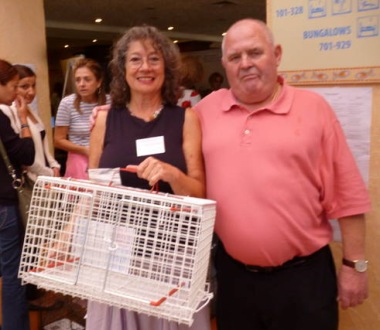Tips for rescuers from the Companion Animal Welfare Conference

Cats Protection booth at Companion Animal Welfare Conference / Photo: Lena Yacoumopoulou
In Lena Yacoumopoulou’s first article for Animal Issues Reporter (AIR), she fills us in on proceedings at the Companion Animal Welfare Conference. AIR is pleased to welcome Yacoumopoulou, who is both an accomplished journalist and a dedicated animal rescuer, to our pages.
By Lena Yacoumopoulou
CEO’s, employees, trustees, vets, researchers, epidemiologists, nurses, designers, salesmen, and mostly volunteers—anyone and everyone to do with animal welfare— packed the beautiful Mare Nostrum Hotel to network, fundraise, exchange ideas and more during three intense days at the 14th annual Companion Animal Welfare Conference (ICAWC) held last month in Vravona, Greece.
ICAWC is sponsored by Dogs Trust UK every year. Why was Greece chosen for the venue this year?
Dogs Trust Chief Executive Clarissa Baldwin said in an interview with this reporter that delegates clamored for a warmer country after the annual conference in Latvia last year. Their wish was granted and even more so since Greece was experiencing record-breaking warm weather this October.
The setting of the hotel was heavenly and convenient for delegates who flew in for the three-day conference, she added. Some 260 participants (77 from Greece) from 31 countries attended, representing 124 organizations worldwide (13 from Greece). Never before did the organizers have to close registration before the conference began; one week before the event, all tickets were sold out.
Up to 600 million stray dogs worldwide
The vision of Dogs Trust is a world “where no healthy companion animal is destroyed for want of a caring home with responsible owners,” and Clarissa adds where “a dog is for life, not just for Christmas.” These are the messages conveyed at the conference every year and they are important because even in the U.K., which is considered an animal-friendly country, according to a Dogs Trust survey, over 126,000 abandoned dogs were rescued during 2011, six percent of whom were put to sleep because of lack of homes and shelters.
Worldwide it is estimated that there are between 500 million to 600 million stray dogs, the majority living in appalling conditions and often prey to widespread culling by government strategy.
There were four workshops and 24 speakers on subjects ranging from dog behavior to the law, getting and retaining volunteers, cat and dog diseases, fundraising tips, running a shelter, neutering, and management of feral colonies, among other themes.
Perhaps no one will forget the video of Worldwide Veterinary Service CEO (WVS) Luke Gamble removing 20 kilos of plastic from a cow’s stomach in India. His surgical intervention to unblock the cow’s intestines was a great public relations stunt to highlight the way we dispose of plastic as well how we care for animals. WVS treated more than 11,000 animals worldwide in 2011. The group donates medicine and helps animal welfare groups with neutering and advice.
How to manage resources wisely
Also thought-provoking was Jeffrey Young, founder of Planned Pethood International, based in Colorado, which supports low-cost neutering in mobile units across America. He has established an additional vet clinic in Merida, Mexico and a state-of-the-art vet hospital in Slovakia, where vets from around the world are trained for free.
Dr. Young said he turns out a large profit from his private vet practice in Colorado (he is proud to be a good businessman) and that is how he funds animal welfare work worldwide. He believes that caregivers should give of their time and money with the big picture as a guide: often volunteers will spend months and a lot of funds saving one animal when those resources could benefit dozens of stray dogs and cats through neutering.
He recommends that animal welfare groups aim to educate otherwise they will just remain perpetual ambulance drivers; they should focus efforts on changing or strengthening the law: in the United States 20 years ago, he illustrated, 24 million animals were euthanized in shelters annually as a government strategy; today through changes in law and awareness, the number has been reduced to an estimated four million each year.

SNIP International booth / Photo: Lena Yacoumopoulou
Dog diseases
On pet travel and diseases, Paula Boyden, Vet Director Dogs Trust, pointed to the prevalence of rabies in Eastern Europe (the incidence of rabies in Greece dramatically declined in the early 70s with the last case reported in 1987) and overall to the tapeworm (echinococcus multilocularis) which can be fatal to humans.
Of particular concern in the Mediterranean basin is Leishmaniasis also known as Kala-azar, a zoonotic disease transmitted by an infected sand fly. In her presentation, Jenny Stavisky, UK epidemiologist, said it can be fatal for both dogs and humans and there is no cure. [Editors note: With proper treatment and medication the disease can be well-managed, and some vets are reporting cures.] The best form of prevention is to keep dogs inside at dawn and dusk and to fit them with a Scalibor collar.
Other dangerous infections from ticks we were told to watch out for are Babesia and Ehrlichia and the often fatal heartworm also transmitted through mosquitoes, therefore the importance of insect repellents such as Stronghold.
Dogs help with cancer detection and juvenile rehab
Claire Guest reminded us all that despite state-of-the-art advances on cancer diagnosis, a dog’s nose often remains the earliest and most accurate mechanism for detection. As Director of Operations of Medical Detection Dogs, she is conducting pioneering research that uses dogs to sniff not only cancer, but blood sugar changes, Addison’s disease and narcolepsy among other life-threatening diseases.
We were impressed by Rebecca Leonardi, PAWS for Progress, who developed the first prison-based dog training rehab program in the U.K.: providing skills to young offenders by teaching them to train stray dogs from the nearby shelter, thus offering a two-fold benefit with one good deed.
Tips on stray cats
Cats were not neglected at the Dogs Trust conference: we were offered challenging questions in feline rescue by Maggie Roberts, vet and co-author of Feline Advisory Bureau’s (FAB) Feral Cat Manual, and Karen Hiestand, Cats Protection. For example would we neuter a stray pregnant cat? (most in the audience said they would); would we treat a very sick cat or euthanize her? (most said they would euthanize). However both issues are not often discussed openly in some countries, in particular Greece.
We got great tips on stray cats from Ian MacFarlaine, Cats Protection, who oversaw 162,000 neuterings in one year alone: that cats are better off on the street than in a shelter; that it’s better to make a vertical cut on the side of a cat when neutering to avoid pressure on the organs as happens with a belly cut; that cats benefit from being neutered as early as in the 9th and 10th weeks. And for those who like to ‘hoard’ cats in their home—it can be anything from five to twenty cats—he pointed out that cats are solitary animals and prefer not to be crowded. (See the Feral Cat Manual he co-authored with Maggie Roberts www.fabcats.org.)
Microchipping and passports
HDI Chip International was present at the conference with passports and chips making them available to individuals and organizations at low rates, reminding us that in Greece these products unfortunately are only dispensed by private vets and at high costs.
Equipment
Every animal welfare organization represented at the conference came away with at least one item donated jointly by Snip International, MDC Exports and Cat Protection. Altogether some 80 items were given out, from dog muzzles and protective gloves to sophisticated cat traps, carriers and restrainers. Thank you to these three groups!

Melvin Dwyer (left), designer of the cat trap and head of MDC Exports, and Annika Lahdeniemi of SNIP International / Photo: Lena Yacoumopoulou
Three Greek success stories
Despite the bad rap that Greece gets for its large number of animal abuses, and they are indeed happening, unfortunately, there were three successes that were noted at the conference: first, that Greece is one of the 27 European states (ahead of the UK and France) that has ratified the European Convention for the Protection of Pet Animals which became effective in 1992. In his presentation, Trevor Cooper, Dog law specialist for Dogs Trust, focused on the “well being” of companion animals as being the core issue in that convention, something which Greek law 4039 also maintains (ευζωια), and which must include clean water and food, shelter and exercise for companion animals.
Greek Animal Welfare Fund (GAWF)
For its part, Greek Animal Welfare Fund (GAWF), now re-named Animal Action Greece, briefed the conference on two major landmarks in Greek animal welfare: CEO Amalia Sotirhiou and Evgenia Mataragka, Communication Manager, reported that in 2006, after years of spearheading the movement, GAWF succeeded in banning ALL animals from circuses in Greece, becoming the first country in Europe to do so.
The other important achievement was to identify and register some 60 barrel dogs in the island of Ikaria, thus bringing attention to the plight of thousands of dogs across rural Greece that are tied up in remote areas to prevent goats from moving from one area to another, often without adequate water, food, shelter or treatment, and an average lifespan of two years.
GAWF’s Carol McBeth kept meticulous records and photos of each dog, worked with the Ikaria municipality, local animal welfare volunteers, filed abuse reports where appropriate and succeeded in getting many farmers to install proper kennels or to remove the dogs altogether. Dogs Trust UK supported the campaign which included neutering, salaries for a campaign organized for one year, two education programs in schools, and an art competition for dimotiko (elementary school) kids.
Volunteerism differs across the globe
At a workshop on volunteerism by expert Amelia Tarzi it became clear that the management of strays differs widely region by region. A well-funded animal welfare organization for example in the U.K. or France can employ a large number of staff and volunteers for much beyond the standard activities of animal care and rescue, such as for education, fundraising, events organizing, managing a charity shop, all of which seemed like a dream for many Greek organizations which often struggle with one or two volunteers and scarce funds. It was underlined at the conference that in Greece volunteerism has not caught on yet as much as in other western countries.
Tarzi stressed the importance of motivating and encouraging the volunteers, but some of us asked who takes care of the volunteers? Who manage the volunteers?
The Animal Healer
All delegates welcomed Elizabeth Whiter, who heals both animals and humans in a holistic manner, as she guided us through deep breaths and sighs and other stress releasing exercises in the conference room. Her book The Animal Healer is available on www.healinganimals.org.
All in all this conference brought together a wonderful group of people devoted to the millions who have no voice.

This reporter (pictured left) was happy to receive a cat trap/restrainer for our group PAWS. The trap was donated by SNIP International, Cats Protection, and Melvin Dwyer (pictured right), designer of the trap and head of MDC Exports. Photo: Lena Yacoumopoulou
Lena Yacoumopoulou has 30 years experience as a writer/radio producer. She started at the bottom level in the film and radio department of the United Nations in New York and worked her way up to Senior Radio Producer, running the English news team. During those 30 years she covered the independence and elections in Namibia, the first ever democratic elections in Haiti, the two wars in Yugoslavia and many international conferences in Africa, the Middle East, Europe and the Caribbean. She was born in Alexandria Egypt in a large Greek community, studied at English and American schools there, and then English and French literature at the University of London. She worked for two years as an editorial assistant at Thames and Hudson, London art book publishers, before leaving for the US in the early 1970′s to seek a better future. She retired from the UN in 2007 and realized her life long dream of living in a house on a Greek island. The plan was to lie under a Tamarisko tree and write her memoirs, but after seeing the appalling conditions of stray cats on Paros, she devoted herself full time to trying to improve their plight, focusing on neutering as a priority. She is a member of the board of PAWS (Paros Animal Welfare Society).
Get fresh AIR! Hit the ‘Follow’ button above to be notified via email of new articles by this reporter and the rest of AIR’s great staff.
Please respect copyright law. Sharing AIR links really helps! But copying more than a couple of paragraphs of content without permission is a no-no. If you’d like to use one of AIR’s articles or one of our photographs, kindly contact us at [airinfo AT yahoo DOT com].
Copyright © 2012 Animal Issues Reporter and AnimalIssuesReporter.org.
All rights reserved.
Shared on Twitter and all over Facebook!
Above post from Tina Frisco